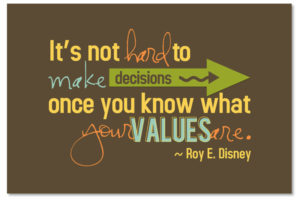Your values are what connect you on a profound level with your audience, your stakeholders. Go back on your values and you’ll find yourself in a crisis. Go back on your values in a crisis and you’ll find yourself without credibility and with a reputation in major decline.
Let’s take Chick-Fil-A as an example.
Back in 2012, Chick-Fil-A found themselves in the midst of a major national controversy after their COO, Dan Cathy, made a public statement opposing same-sex marriage. The controversy broke out, Chick-Fil-A made national headlines, and many people boycotted the restaurant while others rallied in support.
It was a controversy and it could have been a crisis. But it wasn’t.
- Let’s pause a moment and reflect on the definition of a crisis:
A situation or event that has, or threatens to have, a long-term negative impact on your organization’s reputation and/or bottom line.
Why wasn’t this a crisis?
It could very easily have been, but in this case it wasn’t and Chick-Fil-A’s values are the reason.
Chick-Fil-A was founded on Christian values. It’s a family-run franchise with a “business philosophy based on biblical principles” [Source: Chick-Fil-A]. The franchise is even closed on Sundays and has been since it opened its doors in 1946.
 These “biblical principles” have been part of the brand’s identity since its beginning. And even though Cathy’s statement in 2012 stirred up a highly publicized controversy, the statement ran consistent with the values that the brand had always been clear and open about.
These “biblical principles” have been part of the brand’s identity since its beginning. And even though Cathy’s statement in 2012 stirred up a highly publicized controversy, the statement ran consistent with the values that the brand had always been clear and open about.
Yes, the controversy segregated their audience. They lost many customers but gained many as well. The ones they lost might have enjoyed the food, but were not emotionally connected to the brand (they couldn’t have been because their values would be so different). These people may have chosen Chick-Fil-A because they found their food to be yummy or the location convenient, for example.
On the flip side, the customers they kept and gained throughout and post-controversy would be their true brand advocates (with the exception of those who are simply indifferent). These people are likeminded and have beliefs that align with the values of the brand. These people rallied in support.
As a result, Chick-Fil-A’s “sales soared following the controversy” and since, “the privately held company’s valuation [has soared] north of $4.5 billion.” [Reference: Wikipedia]
The opposite affect
Now, what would have happened if Cathy had backtracked on his statement, rather than held strong on the company’s values? Both sides of the controversy would have been upset – and the side that shares the same biblical values as the brand would have felt betrayed. This is the exact scenario that Susan G. Komen for the Cure Foundation put themselves in, also in 2012, and look where they are now.
Since the controversy, Chick-Fil-A did choose to take a step back and stop donations to certain charities, though this has more to do with them not wanting to continue to ask for trouble, rather than not holding strong on their core values.
Hold true to your brand’s values
Now I’m not saying to go out and make a controversial statement and segregate your audience. What I’m saying is to make sure your organization’s brand values are strong and align with every aspect of your business and messaging. And then, if you’re ever faced with a crisis, be strong enough to hold true to those values.
Here’s a past post of mine that outlines how you can protect your organization from losing sight of your brand’s values in a crisis.
Thanks to It Works for Bobbi for the image

Author of Crisis Ready: Building an Invincible Brand in an Uncertain World, Melissa Agnes is a leading authority on crisis preparedness, reputation management, and brand protection. Agnes is a coveted keynote speaker, commentator, and advisor to some of today’s leading organizations faced with the greatest risks. Learn more about Melissa and her work here.

Leave a Reply